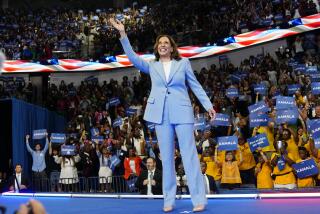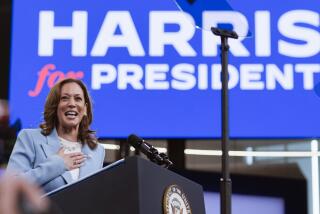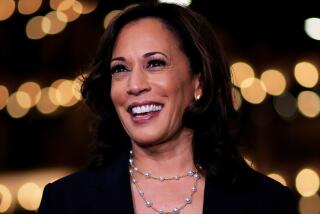Dukakis Staff Projects Pre-Convention Majority
- Share via
BOSTON — In a sharp upgrading from their previous predictions, campaign strategists for Michael S. Dukakis said Thursday that the Massachusetts governor is poised to amass enough delegates to win the Democratic presidential nomination by the time California polls close on June 7.
The revised schedule would allow Dukakis to avoid public wooing of reluctant final delegates, as well as potentially fractious bargaining for support from rival candidate Jesse Jackson.
Moreover, aides say, the sooner Dukakis can claim victory, the sooner he can focus on choosing a running mate, and lay plans for the July 18-21 Democratic National Convention in Atlanta and the fall campaign against likely Republican nominee George Bush.
Previously, Dukakis said that he expected to win only a “clear plurality” of delegates by June 7, and only later draw enough delegates to build the necessary majority.
“The good news is we now are in position to put together a clear nominating majority by the last day of the process,” Tad Devine, who runs Dukakis’ delegate operation, said in an interview.
“We think we can do it by the time California and New Jersey finish voting,” he said.
According to the Associated Press, Dukakis has 1,500 delegates in his column, or 581 delegates short of the simple majority, or 2,081, needed to win the nomination on the first ballot. Jackson has 927 delegates.
Campaign manager Susan Estrich said she is “very hopeful” of reaching the majority by June 7.
A total of 573 Democratic delegates are at stake in upcoming primaries in Montana, Oregon, New Mexico, West Virginia, Nebraska, New Jersey and California.
Of those, Dukakis “has the potential to win 300 to 350, maybe even better,” Devine said.
If Dukakis wins his 350 delegates in the remaining primaries, according to Devine’s calculations, he needs only draw about 200 from an additional 1,100 delegates still available from various pools in a two-man race.
The first pool includes 367 “super delegates”, mostly members of Congress and members of the Democratic National Committee. Dukakis already has won support from 178 super delegates, Devine said.
To help woo others, Dukakis is personally calling up to 25 delegates a day.
A second pool includes 188 delegates either elected as uncommitted, or still to be chosen in multi-tiered state caucuses. A final pool of more than 500 delegates is pledged, but not legally bound under party rules, to former candidates Sen. Albert Gore Jr. of Tennessee and Sen. Paul Simon of Illinois. Both men have suspended their campaigns.
Dukakis on Thursday visited West Virginia, which holds its primary Tuesday. He focused on jobs and economic development and repeatedly summoned the memory of John F. Kennedy, who in 1960 won a key primary victory in the state.
He also won warm praise from mine union president Richard Trumka and a souvenir brass miner’s lamp.
Trumka lauded the Massachusetts governor for “his vision and his strength and his leadership” and attacked Bush, the expected Republican nominee, for “doing nothing” to make the nation less dependent on oil imports.
During an early-morning speech in Charleston, W. Va. Dukakis pledged to revitalize the Appalachian Regional Commission, an economic development agency established by Kennedy that the Reagan Administration has sought to dismantle.
The audience of elected officials and local Democratic activists gave Dukakis the kind of enthusiastic reception his low-key campaign seldom receives.
Meanwhile, Dukakis and his wife, Kitty, reported $108,957 in income for 1987, according to forms the campaign released Thursday.
The couple’s income was about half that of Democratic rival Jackson and a little more than one-third the 1987 income reported by Bush. In all, the Dukakises paid $25,892 in federal taxes.
Staff writer David Lauter contributed to this story from West Virginia.
More to Read
Get the L.A. Times Politics newsletter
Deeply reported insights into legislation, politics and policy from Sacramento, Washington and beyond. In your inbox twice per week.
You may occasionally receive promotional content from the Los Angeles Times.











